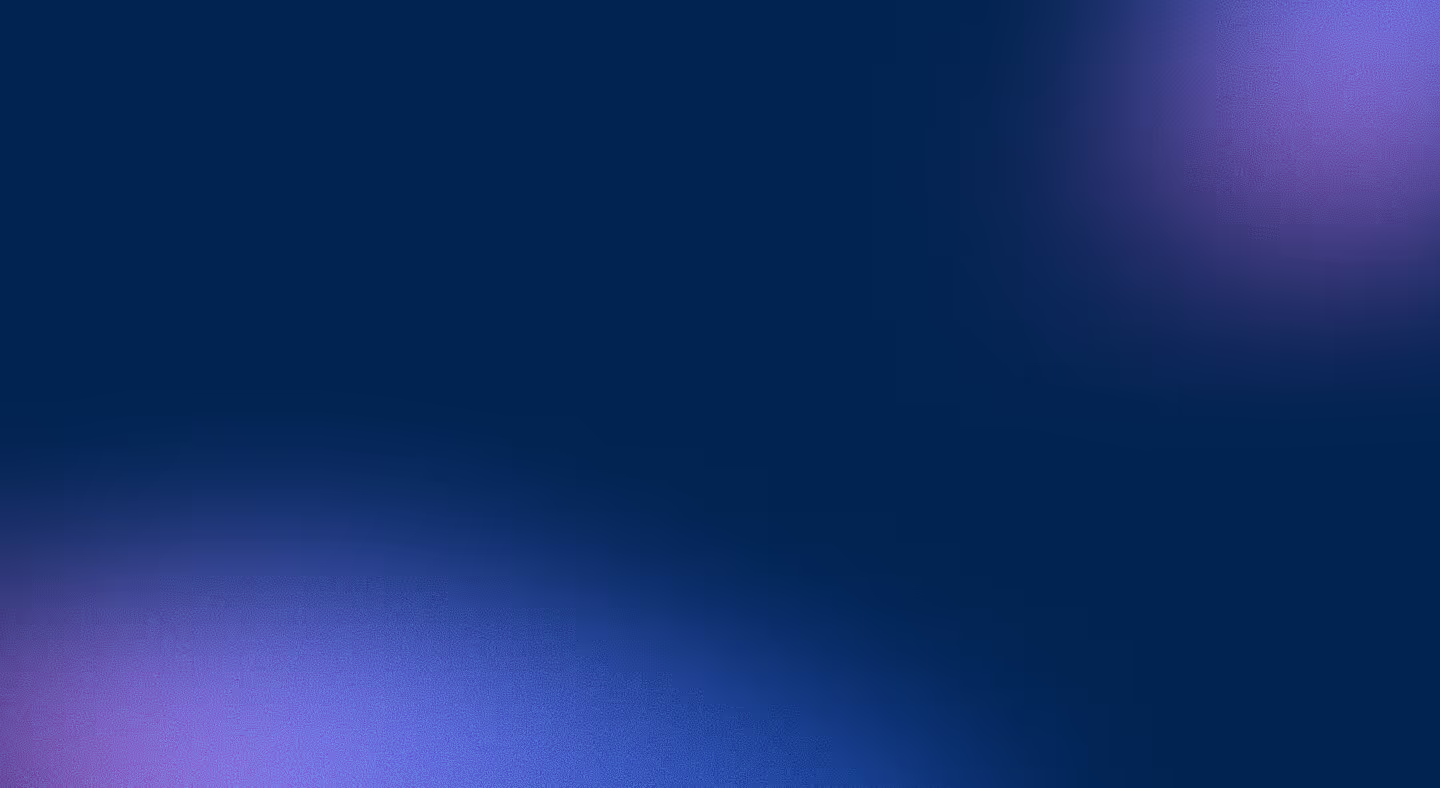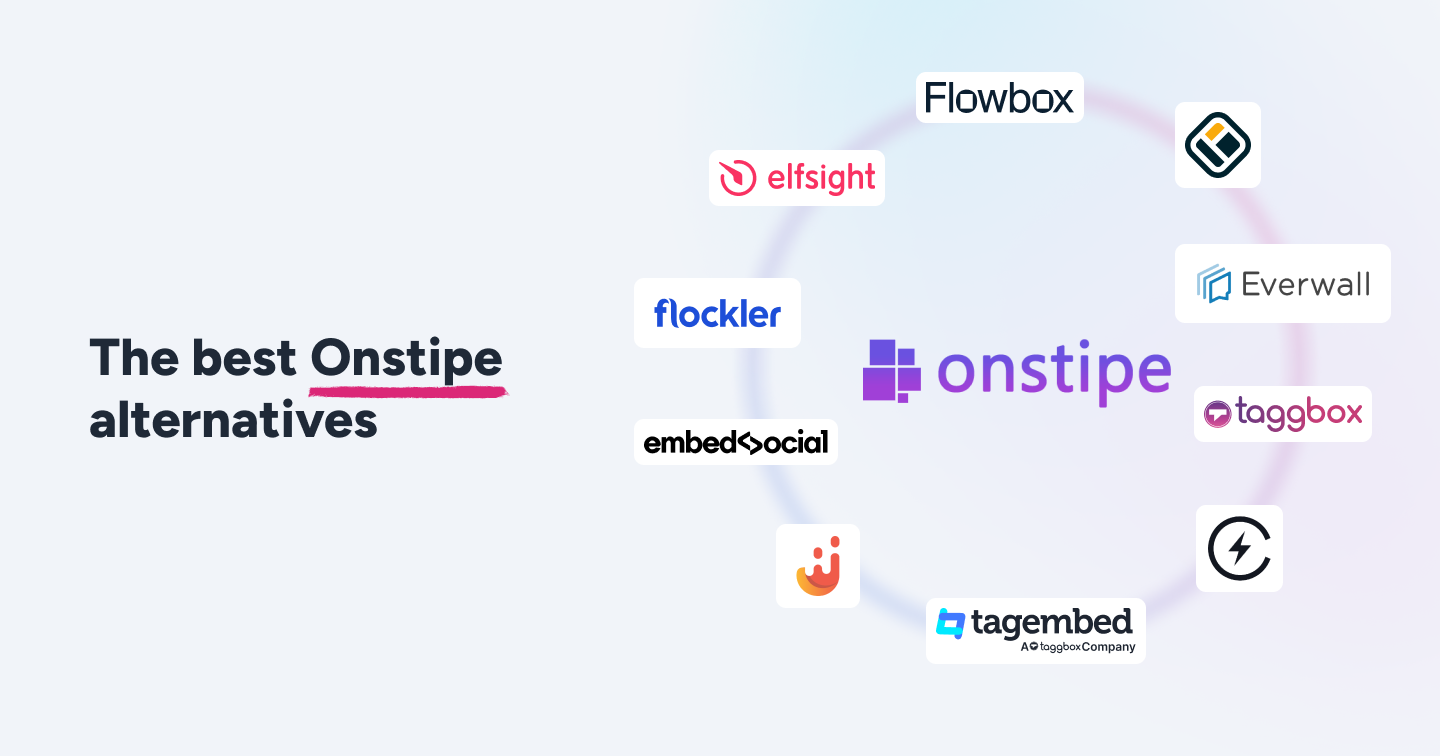Summary
- Embedding a Facebook Page feed on your website helps showcase dynamic social posts and build trust with your visitors.
- With Flockler, you can easily collect Facebook posts, choose layouts, moderate social wall content with AI, and embed them on any site with a simple code.
- Examples like New Zealand Cricket, Deutsche Bundesbank, CORA, and USO use Flockler to display Facebook social walls on webpages.
Thirty-five percent of the world’s population, 2.8 billion people, log in to Facebook every month.
Roughly the same percentage of the world's 400 million active websites display Facebook and other social media feeds.
Sometimes, embedding a single Facebook post to a blog article is all you need, and Facebook has a handy tool for you to create the embed code. For the feed of your organisation’s latest posts, the Facebook Page plugin is the most popular option. The plugin is free and easy to add to most websites.
However, the standard Facebook Page feed plugin comes with several disadvantages.
First of all, you can’t change the standard plugin’s look & feel and match it to your brand styles. The layout is a single-column stream that you can add to the sidebar but it can’t take over the whole page width or, for example, be a carousel in the middle of the page. Also, the height needs to be fixed, which creates a scrollable bar for the embedded FB feed on your website. Especially with mobile and tablet devices, scrollable elements inside the page can become a nightmare for the website visitor.
Secondly, you can’t add other social media channels and create a curated content feed from multiple sources with the standard Facebook Page feed plugin. You are allowed to display one Page of the organisation at a time, and there is no support for user-generated content campaigns either. These days, showing social proof from your customers has become more relevant, and social reviews help you stand out from the competition.
Third of all, you won’t be able to moderate the feed and remove posts that are no longer relevant when using FB’s Page plugin. Sometimes, your organisation might publish something relevant for the Facebook audience but perhaps it is not something you’d like to be the first post shown on the company homepage.
Considering all these disadvantages, how do brands and organisations like Continental, Deutsche Bundesbank, and Harvard University embed Facebook feeds on their websites?
They use a social media aggregator to gather all their branded social media feeds and UGC from customers in one place. From there, they then create social media walls, grids, carousels, and slideshows and display them on websites and other digital channels.
Four steps on how to embed a Facebook Page feed on any website
Here are four steps on how to embed a Facebook Page feed on any website:
- Create a free Flockler account
- Gather Facebook Page feeds to Flockler
- Select a Facebook Page feed layout
- Embed a Facebook Page feed on any website
1. Create a free Flockler account
Sign up for our free trial if your organisation doesn’t have a Flockler account just yet. You don’t need a credit card at the start, and the free trial version includes the entire product without Flockler branding or ads.
2. Gather Facebook Page feeds to Flockler

Immediately after signing up, Flockler’s bot will ask you to add at least one automated feed that pulls in fresh content every 5-15 minutes. Here, the logical choice is to start with the Facebook feed, but you can add content from X (formerly Twitter), Instagram, YouTube, TikTok, and Pinterest, too. See the complete list of supported social media sources.
From Facebook, you can embed:
- Posts by any public Page
- Posts mentioning the Page you manage
- Posts from your managed Facebook Page’s Community tab
To gather posts from a Page, you will need to log in with your Facebook account and connect it with Flockler. As long as you manage at least one Page, you can gather posts from any other public Page, too.
After setting up the feed, Flockler gathers new content every 5-15 minutes.
3. Select a Facebook Page feed layout
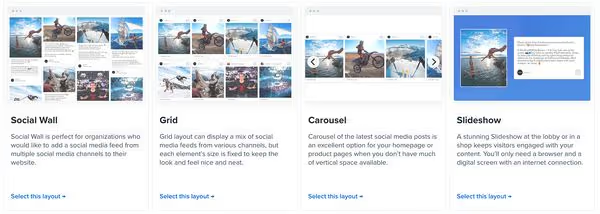
The next step is to decide how to display the Facebook Page feed on your website and other digital services. Flockler’s 'Display' tab has got four options:
- Wall: This is the right choice if you’d like to show the caption texts in full and combine content from multiple social media channels.
- Grid: Customers who’d like their FB Page feed to have a fixed size often prefer the Grid layout.
- Carousel: This is the perfect option for your homepage and footer when the vertical space is limited. Your website visitors can flick through the posts to the left and right.
- Slideshow: If you have digital screens at the office or in your shop, the Slideshow will impress your visitors and encourage them to follow you on Facebook. The Slideshow rotates the latest posts and keeps the content fresh without any manual work. All you need is a browser and internet connection.
Have you embedded Facebook feeds on websites? With Flockler, it takes a couple of minutes to get started. Sign up for the free trial now!
4. Embed a Facebook Page feed on any website

After selecting your layout for the Facebook Page feed, Flockler gives you an embed code (or URL) that you can add to any of your digital services.

Most website builders allow users to add embed codes, but share Flockler’s embed code with the website developers if you are uncertain about how to do it. If any extra help is needed, do not hesitate to send us a message via email or live chat – the Flockler service team is happy to help!
For more detailed instructions on how to embed a Facebook Page feed on a website, here are tutorials for some of the most popular website builders and e-commerce platforms:
Four examples of the Facebook Page feed on a website
With Flockler, you don’t need any technical skills when creating your Facebook Page feed layout. From the layout’s settings, and with the help of Flockler’s customer service team, you can further customize the look & feel of each embedded feed. We are happy to make sure that the feed fits perfectly with your website or branded digital services.
For your inspiration, here are four examples of the Facebook Page feed embedded on a website.
New Zealand Cricket
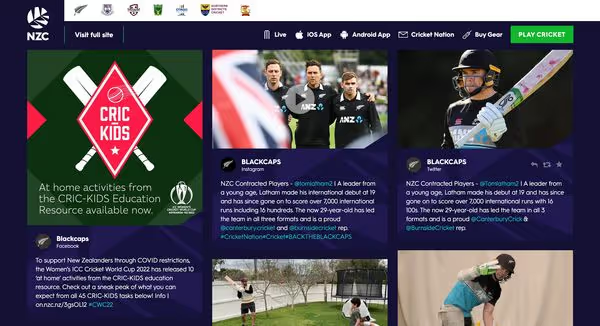
The homepage of the New Zealand Cricket team highlights the latest content from Facebook, Instagram, and X (formerly Twitter). As one of the world’s best cricket teams, they are mentioned by the press, fans, and players, and the team is actively curating posts from elsewhere to add social proof and keep fans engaged with their website. The purple-coloured social media feed is the perfect start for the website experience.
Deutsche Bundesbank
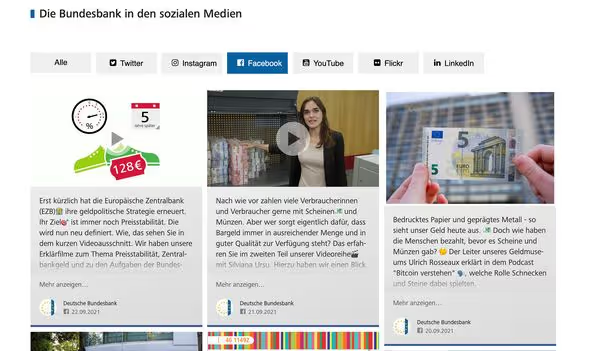
The Deutsche Bundesbank has embedded Flockler’s social wall on their News section. Website visitors can view the Facebook Page feed together with other social media feeds, and the look & feel matches the organization's brand guidelines. For the finance industry, a social media wall brings the website to life and often highlights the people working behind the scenes.
Embedding a Facebook Page feed on any website takes a few minutes. Sign up for the free trial now!
CORA

CORA, one of the largest hypermarket chains in France, gathers Facebook Page feeds in one place with Flockler. Each shop has its own Facebook Page feed to show the latest news and offers between the online shop’s products. For retailers, embedding Facebook and Instagram feeds on websites is the perfect way to increase the time spent on site and drive conversions. Furthermore, with shoppable Instagram feeds, website owners can create a direct path from inspirational social media posts to purchase.
USO
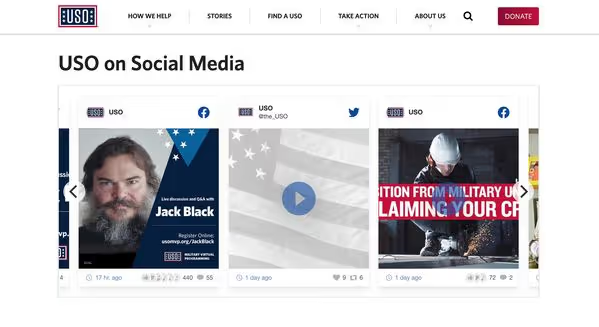
USO is a non-profit organisation supporting America’s military by keeping them connected to family, home, and country. A Facebook Page feed, combined with tweets and Instagram images, is displayed with Flockler’s Carousel layout on their News page. The Carousel layout is the right choice if you don’t want the social media feed to take too much space vertically but would still like your users to explore some of the latest posts from your social media channels. An inspiring social media feed increases time spent on site and grows the number of followers.
Does your organisation embed Facebook Page feeds on websites? Sign up for Flockler’s free trial and create your feed in a few minutes. No credit card is needed at the start.
FAQs
Can you embed multiple Facebook Pages into one feed?
Yes. With Flockler, you can pull in content from multiple Facebook Pages and combine posts with feeds from Instagram, X (Twitter), YouTube, TikTok, and more. You can create a centralized social wall by collecting feeds via hashtags or keywords, and turn on auto-updating mode for social walls to refresh every 15 minutes.
Can I customize the look & feel of the embedded Facebook feed?
Yes, Flockler offers four layout options, such as grids, carousels, walls, and slideshows, for the social wall. Next, you can edit the design of your wall by changing color, font, and themes to align it with your website.
Do you need coding knowledge to embed a Facebook page?
No, Flockler generates an embed code (or URL) you can paste into most website builders like WordPress, Wix, Shopify, and Squarespace.
.png)

